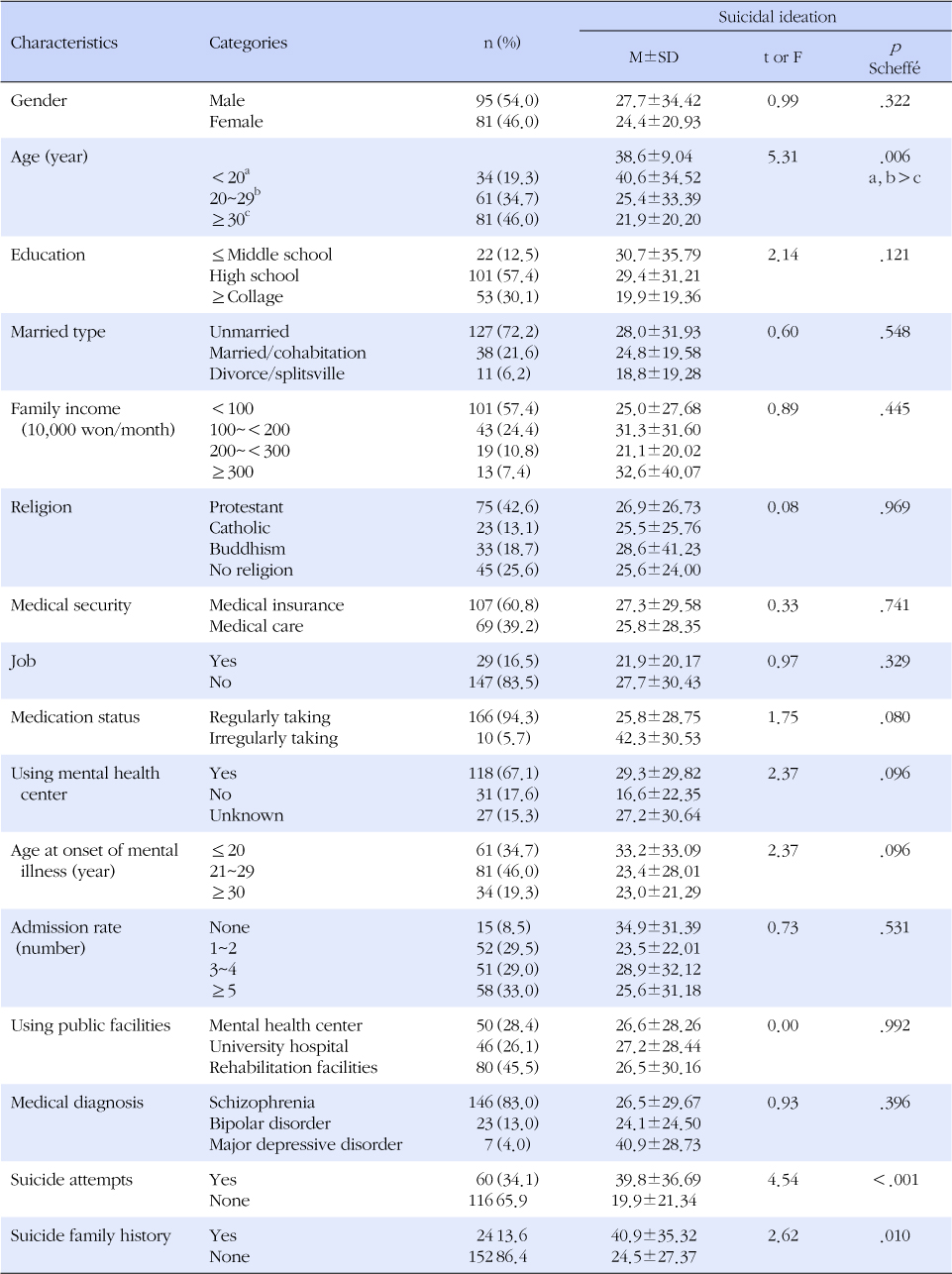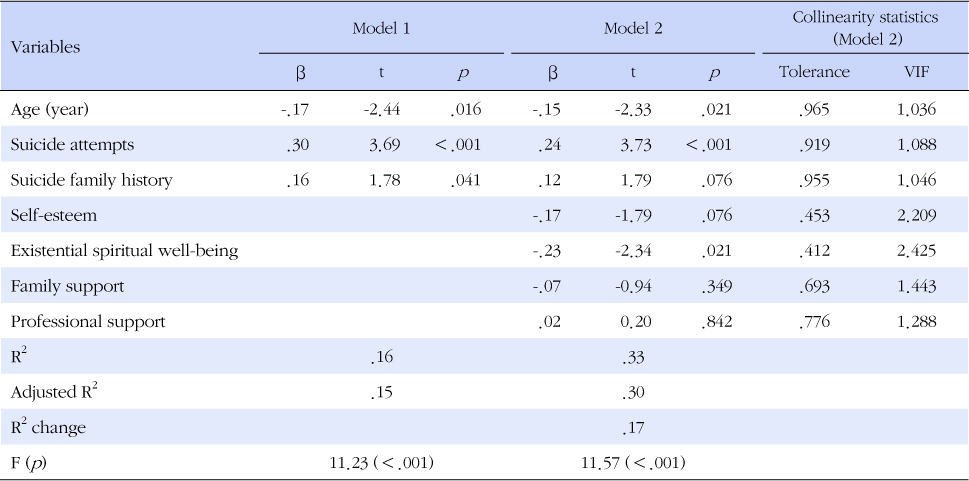References
1. Bai JI. The experience of families with psychiatric patients: A grounded theory approach. J Korean Acad Psychiatr Ment Health Nurs 2001. 10(1)53–65.
2. Cha SH, Doh BN. Family support, self-esteem and powerlessness in psychiatric patients. J Korean Acad Psychiatr Ment Health Nurs 2002. 11(3)325–335.
3. Chun SK, Park BG, Lee HB. A study of risk factors related to mentally illness persons' suicidal ideation. Ment Health Soc Work 2007. 26(1)348–376.
4. Cobb S. Social support as a moderator of life stress. Psychosom Med 1976. 38300–314.
5. Jae YM. Suicide and psychiatric disorder. J Korean Soc Biol Ther Psychiatry 2004. 10(1)3–10.
6. Jeon HJ, Lee JY, Lee YM, Hong JP, Won SH, Cho SJ, et al. Lifetime prevalence and correlates of suicidal ideation, plan, and single and multiple attempts in a korean nationwide study. J Nerv Ment Dis 2010. 198(9)643–646.
7. Jon BJ. Self esteem: A test of measurability. Yonsei Nonchong 1974. 11107–130.
8. Kang HS. An experimental study of the effects of reinforcement education for rehabilitation on hemiplegia patients' self-care activities 1984. Seoul: Yonsei University; Unpublished doctoral dissertation.
9. Kao YC, Liu YP. Suicidal behavior and insight into illness among patients with schizophrenia spectrum disorders. Psychiatr Q 2011. 82(3)207–220.
10. Kye EK. The Relationship of suicide probability and spiritual well-being 2007. Seoul: Seoul National University; Unpublished master's thesis.
11. Kim MY. Factors affecting internalized stigma of patient with schizophrenia. J Korean Acad Psychiatr Ment Health Nurs 2012. 21(2)108–117.
12. Kim SW, Kim SJ, Mun JW, Bae KY, Kim SY, Yang SJ, et al. Psychosocial factors contributing to suicidal ideation in hospitalized schizophrenia patients in Korea. Psychiatry Investig 2010. 7(2)79–85.
13. Kim YY. The efficacy of self-esteem improvement education for persons with mental disability. J Res Educ 2005. 22155–176.
14. Kontaxakis V, Havaki-Kontaxaki B, Margariti M, Stamouli S, Kollias C, Christoulou G. Suicidal ideation inpatients with acute schizophrenia. Can J Psychiatry 2004. 49(7)476–479.
15. Lee EJ. A study on the effect of social support on mental health disorder's suicidal ideation 2009. Seoul: The Catholic University of Korea; Unpublished master dissertation.
16. Lee MA, Kim SH, Park JH, Sim EJ. Factors of suicidal ideation and behavior: Social relationships and family. Korea J Popul Stud 2010. 33(2)61–84.
17. Lee SG. A study on community-based social work practice of mental health 1993. Seoul: Seoul National University; Unpublished master dissertation.
18. Paloutzian RF, Ellison CW. In : Peplau LA, Perlman D, eds. Loneliness, spiritual well-being, and quality of life. Loneliness: A sourcebook of current theory, research and therapy 1982. New York: Wiley;
19. Park HS. Effects of core competency support program on depression and suicidal ideation for adolescents. J Korean Acad Nurs 2009. 39(6)851–859.
20. Park JA, Yoo SK. Relationship of resilience, spiritual well-being and parental attachment. Korean J Couns Psychother 2003. 15765–778.
21. Radomsky ED, Haas GL, Mann JJ, Sweeney JA. Suicidal behavior in patients with schizophrenia and other psychotic disorders. Am J Psychiatry 1999. 1561590–1595.
22. Rasic DT, Belik SL, Elias B, Katz LY, Enns M, Sareen J. Spirituality, religion, and suicidal behavior in a nationally representative sample. J Affect Disord 2009. 11432–40.
23. Reynolds WM. Suicidal ideation questionnaire: Professional manual 1987. Odessa, FL: Psychological Assessment Resources;
24. Rosenberg M. Society and adolescent self-image 1965. Princeton. N J: Princeton University Press;
25. Statistics Korea Data. The statistics of death in 2011 2011. Retrieved September 10, 2011. from
http//meta.narastat.kr.
26. Sin MS. An empirical study of the mechanism of suicide: Validation of the scale for escape from the self 1992. Seoul: Yonsei University; Unpublished doctoral dissertation.
27. Siris SG. Suicide and schizophrenia. J Psychopharmacol 2001. 15127–135.
28. Song HS, Kim KH. A study for the spiritual well-beingand the spiritual needs of inpatients. Chung-Ang J Nurs 2002. 627–35.
29. Tea YS. A study on correlation between perceived social support and depression on the cancer patients 1985. Seoul: Ewha Womans University; Unpublished master's thesis.



